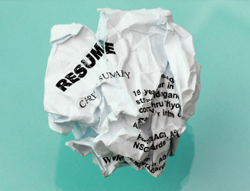Obesity Discrimination Becoming a Fact of Life
26 September 2012

Someone once wrote a joke news story headlined “Unemployment Rating Among Young, Hot Women Holding at Zero Percent.”
It’s funny because there’s a ring of truth to it. Attractive people are far more likely to get hired in positions that interact with the public than unattractive people.
But obesity also correlates strongly with higher health care costs – and employers are coming under increasing pressure to rein in these costs. Why? Because actual claims experiences still largely determine health insurance premiums in the workplace. A healthier workforce means fewer health insurance claims, which means lower premiums.
How big is the effect? Huge: Health care spending was 56 percent higher for obese individuals than for non-obese individuals, according to Helen Darling, the CEO of National Business Group on Health. And health care premiums now run nearly $10,000 per year per employee. Which means that choosing an obese employee over a normal-weight employee, all other things being equal, would potentially cost the employer some $5,000 to $6,000 per year, in the long run, in increased premiums alone.
That leaves aside increased absenteeism, lower productivity levels among out-of-shape workers, and spillover effects into workers compensation premiums.
A recent study published in the International Journal of Obesity confirmed anecdotal reports of what activists are calling size and weight discrimination.
An overt, written company policy that actually discriminates against Jews because of an elevated risk ofTay-Sachs disease, or discrimination against African Americans because of an increased risk of high blood pressure or sickle-cell anemia would be clearly illegal: Both groups are a protected class under federal and state anti-discrimination laws.
Overweight people don’t get the same kind of protection under the law, though. They are simply not a protected class under federal anti-discrimination laws.
And so we have an increasing number of large employers enacting specific policies requiring hiring managers to discriminate against overweight people.
States probably won’t protect you.
Only Michigan – a historically pro-union, pro-labor state – has a statute on the books that includes the obese as a protected class under its anti-discrimination laws. And companies aren’t exactly flocking to Michigan to hire people.
You can expect weight and build discrimination in the workplace to continue – and it’s not just Mom and Pop shops doing it. A recent Aon Hewitt study indicates that as many as half of large employers expect to provide significant disincentives to employees, including increasing employee costs for health insurance, if they are overweight or smoke.
Meanwhile, workers at Jones Lang LaSalle, a Chicago real estate company, receive a 200 dollar bonus for taking a medical exam each year and hitting certain objectives. If they don’t smoke, and they aren’t overweight, they get a 10 percent discount on their contribution to their health insurance plan. And Broward County requires employees to submit to a blood sugar and cholesterol test, or they get their pay docked by $40 per month.
The U.S. military prohibits promotions, decorations or any other “favorable personnel action” for those who do not meet height / weight standards – and eventually discharges those who do not come into compliance – not because of operational or tactical considerations, so much, but specifically to control health care costs.
More companies, too, are embracing “wellness programs,” designed to lower health care costs and increase productivity by making weight loss programs, smoking cessation and exercise programs available to workers at free or substantially reduced costs.
Some critics of these programs have filed suit, claiming, for example, that discrimination against the obese amounts to a violation of the Americans With Disabilities Act (ADA). It’s too early to tell whether the courts will rule with them. But even if they do, that will not change the huge disparity in health care utilization and expenditures between obese and normal weight individuals. So unless health care costs are fully socialized, employees will still have a marked incentive to discriminate. It just may go underground.




